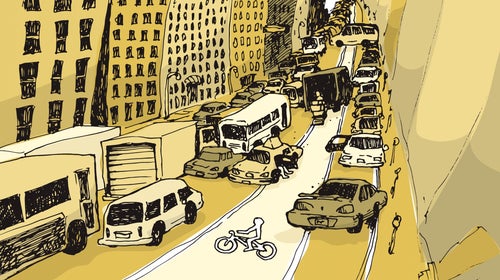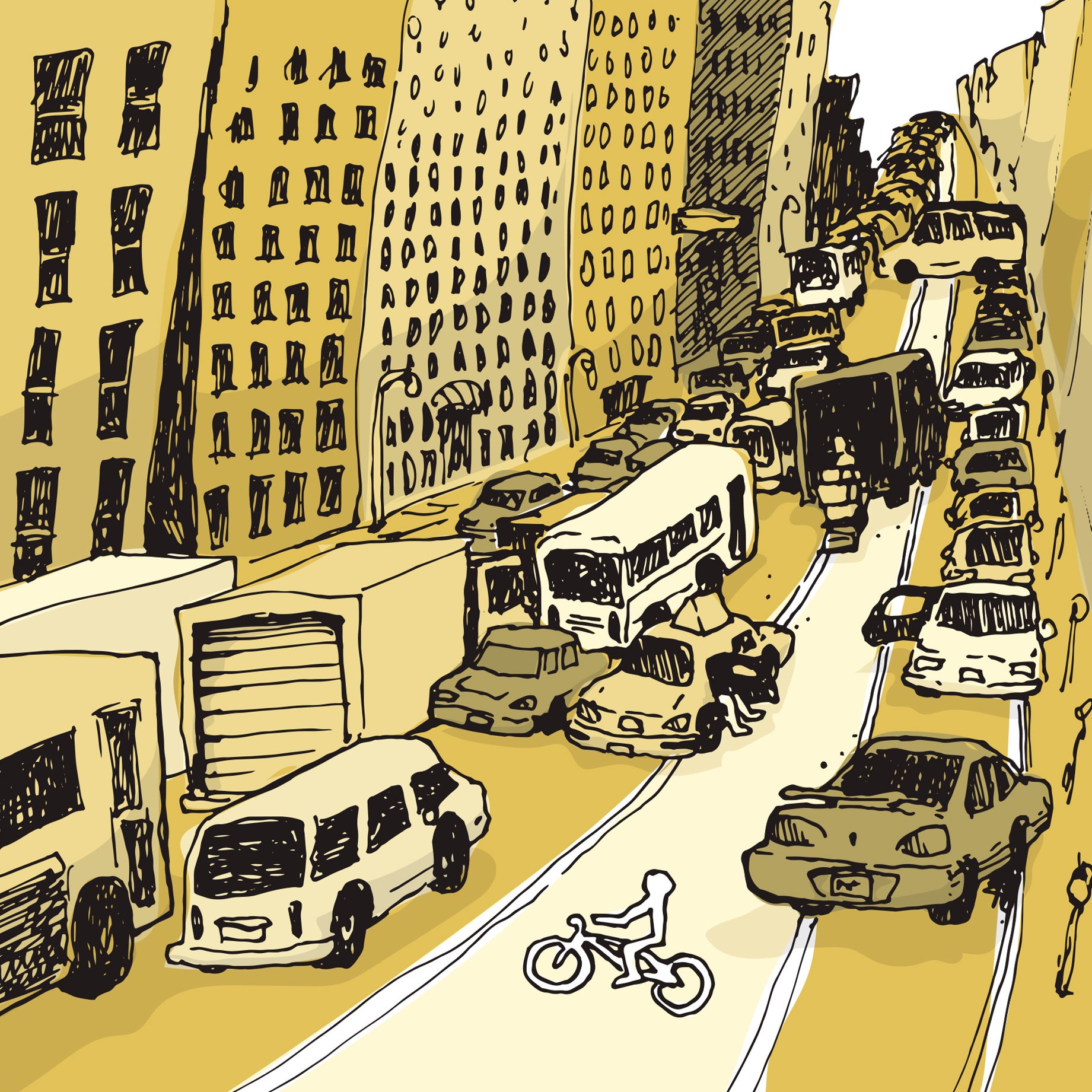Recently, the Washington Post published entitled, “I Blocked a Bike Lane. So what?” It’s either profoundly clueless or a masterfully executed bit of trollery, depending on how you look at it. Basically, the writer pulls into a D.C. bike lane while waiting for a parking spot, which ends up taking “a really long time,” and when a cyclist calls her out on it, she gets indignant. Her conclusion:
But not every violation is a hazard. We live in a city where things can’t always be orderly. Better to focus on the violators who are making the roads more dangerous. (I’d start with the cyclists, but that’s just me.) And once we’ve gotten actual dangers under control, we can turn to everyone else.
Wow. Cyclists are the ones making the roads more dangerous, really? Here in my disorderly city, we have a succinct response for nonsensical assertions such as this: Dafukouttaheah.
Nevertheless, the Post piece is a perfect illustration of how driving isolates us from our environment and distorts our perception of safety. Consider, for example, the assertion that “not every violation is a hazard.” Actually every violation is a hazard; that’s why they’re called “violations” and not “mitzvahs.” Sure, when you’re behind the wheel of a car, those “No Parking Here to Corner” signs may seem like arbitrary rules placed there merely to annoy and inconvenience you, but the fact is you’re driving a ton or more of heavy machinery around a crowded city, not playing a game of Sorry! So, when you decide to park there anyway because “not every violation is a hazard,” there’s more on the line than whether or not you get a ticket. What you’re really doing is obscuring the sight lines for all the cyclists, pedestrians, and drivers who are attempting to safely navigate that intersection. And the consequences can be fatal.
The same holds true for bike lanes. Drivers seem to think cities festoon their streets with bike lanes as haphazardly as Rip Taylor tosses confetti. However, if a transportation department went through all the trouble of installing a bike lane, it’s almost certainly because there was a demonstrable need for it—like because cyclists were dying. Yet every cyclist who’s confronted a bike lane blocker over blocking a hard-won safe haven knows the default reply: It’s always some variation on “What’s the big deal? Just go around me.”
Using the bike lane as your personal layover zone is basically hitching a ride on a humanitarian aid plane and snacking on the airdrop boxes.
Drivers: If you’ve never encountered a stopped car while cycling in a bike lane, you have no idea how jarring it actually is. We prefer not to ride in the car lane for the same reason you prefer not to idle in it: Other drivers tend to lose their shit when they think somebody’s slowing them down. So instead you sit in our lane and make it our problem, cavalierly commandeering our lifeline. Using the bike lane as your personal layover zone is basically hitching a ride on a humanitarian aid plane and snacking on the airdrop boxes.
A key reason motorists feel comfortable blocking bike lanes and committing other seemingly “minor” violations is that they equate driving with Serious Business and cycling with frivolity. Consider the writer of the Post piece, who blocks the lane for the following reason:
Late to pick up my son, I noticed a fellow parent about to vacate a spot, so I pulled over to wait for him to leave.
Ah yes, certainly nobody cycling in the bike lane could be doing something as important as picking up a child. People sometimes accuse cyclists of being “entitled,” but there is no road user more entitled than the motorist, and there is no motorist more entitled than one who’s running late for child pickup or drop-off. When the precious offspring is in transit, regular driver selfishness gives way to solipsism, and everyone else must assume just a little more risk in order to accommodate them. For example, every parent who blocks a bike lane or insists on double-parking because they can’t be bothered to find a legal spot and walk a few blocks to the school contributes to the utter shitshow that is the school at arrival and dismissal time, which in turn makes the streets more dangerous for everybody, especially the children.
All of this is complicated by the fact that the automobile completely shuts off our ability to engage in introspection or to question our own behavior. If I ride my bike into Manhattan and get stuck in a downpour, I think to myself, “Damn, should have taken the subway,” and next time I check the weather forecast before heading out. Motorists, however, will steer their cars right into the same traffic jam day after day without ever questioning their poor decision to drive. It’s like Groundhog Day, only without the eventual catharsis. Instead, they’ll look for someone else to blame (cyclists are a popular scapegoat), and they’ll inconvenience everyone else in the process by violating their right of way, to wit:
Still, if we’re going to cite everyone who double-parks for a couple of minutes (with her signal on, to warn everyone behind her), no one will ever get a delivery again. Or be able to drop off a child at a downtown school. That’s the city.
No, that’s not the city. That’s not even the suburbs. People drop children off at school, make deliveries, and do all sorts of vital things by bicycle all the time. No, what slows down drop-offs and deliveries and everything else is your decision to get around in a cumbersome automobile despite the demonstrable impracticality of your decision.
But perhaps the most dangerous notion drivers have is that if they do something unsafe quickly enough, it’s not a big deal. It’s like the five-second rule, only instead of picking up a dropped Cheeto and eating it, they’re playing with your life. Pulling into the bike lane, flipping a quick U-turn, running the light just after it’s changed…no harm, no foul, right? Even New York City Mayor Bill de Blasio earlier this year:
“If someone’s blocking…a bike lane for 30 seconds while they take out the groceries or to let their kid off, I don’t think they should get a ticket for that,” he said. “If someone leaves their car for any meaningful amount of time, they should be penalized and that should be an enforcement priority.”
On August 10, on Central Park West, an Australian tourist riding in the bike lane was forced into traffic by a livery cab driver who pulled into the bike lane. She was then by the driver of a private sanitation truck. In matters of life and death, a “meaningful amount of time” is measured in fractions of a second.
When you choose to drive in a city, you’re not a VIP beset by inconvenience on all sides. You’re a bull in a china shop asking a lot—and sometimes too much—of the people all around you. It is a big deal. Act accordingly.


